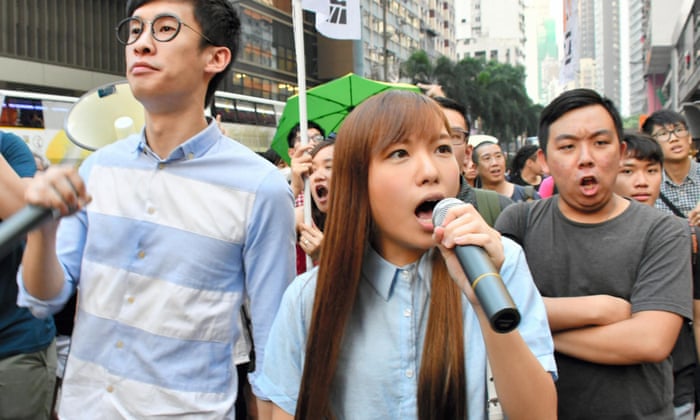By Tom Phillips in Beijing

Newly elected lawmakers Yau Wai-ching (R) and Sixtus Leung (L), who have been barred by China from taking their seats in Hong Kong’s parliament.
Beijing’s unprecedented eviction of two pro-independence activists from Hong Kong’s parliament has dealt a severe blow to “political extremists”, a Communist party-controlled newspaper has claimed as members of the city’s legal community prepared to take to the streets in protest.
One day after Beijing effectively barred Sixtus ‘Baggio’ Leung and Yau Wai-ching from taking up their seats in the former colony’s 70-seat legislative council, an editorial in the Global Times praised their ousting, arguing that the appeasement of such voices would plunge the financial hub into confusion and ruin.
The Communist party’s official mouthpiece, the People’s Daily, said Beijing was taking decisive action against an intolerable and unrepentant collection of pro-independence “elements” who posed a direct threat to China’s sovereignty and national unity.
“The central government will not hesitate to take effective measures to crack down on and curb the “Hong Kong independence” [movement],” it said.
Hong Kong’s South China Morning Post echoed those views, describing the intervention, which came in the form of a highly unusual interpretation of the former colony’s mini-constitution, as a “strong tool to stamp out pro-independence forces”.
“Beijing is determined to keep separatists out of public office,” the pro-establishment newspaper said.
Pro-democracy activists have reacted to the intervention with astonishment and dismay while the British government expressed its concern in a brief and cautiously worded statement.
In a statement released on Monday night two of Hong Kong’s leading pro-democracy voices, Nathan Law and Eddie Chu, said Beijing’s ruling was not simply an attack on two pro-independence politicians but rather an attempt to “put the political reins” on the whole of Hong Kong’s pro-democracy movement.
“All participants in the democratic movement must stand in solidarity, for no one is safe alone, in the face of such a dictatorship which sees any effort to strive for democracy as a secessionist threat to its rule,” they said.
Speaking to the Guardian, on Monday, Holden Chow, a member of Hong Kong’s pro-Beijing community, suggested Beijing’s intervention was indeed intended to cow those politicians who dared to promote causes such as independence from China.
Chow said Beijing’s move against Yau and Leung should also serve as a warning to those backing “self-determination” -- the idea that Hong Kong’s citizens should have a say in how the former colony is governed after 2047 when the current ‘one country, two systems’ framework under which it has been ruled since handover in 1997 expires.
Chow’s party, the Democratic Alliance for the Betterment and Progress of Hong Kong (DAB), has called for a review of whether another pro-democracy politician, Lau Siu-lai, should also be blocked from taking up her seat because of views.
Hong Kong’s latest political crisis has been brewing for months, with the emergence of a new generation of activists who came of age during the 2014 umbrella movement protests and are now pushing for greater autonomy or outright independence from mainland China.
Six such figures claimed seats in the semi-autonomous city’s parliament in early September, including 25-year-old Yau and 30-year-old Leung, who have publicly backed the idea of a complete split with China.
The two firebrand millennials incurred Beijing’s fury last month when they used a swearing in ceremony as a platform to lash out at China’s rulers, unfurling flags that read “Hong Kong is not China” and using language some found offensive to refer to China.
On Monday, Li Fei, the deputy head of China’s most important legislative panel, told reporters the pair were “national and ethnic traitors”, adding ominously: “All traitors and those who sell out their countries will come to no good end.”
While China’s state-run media has applauded the central government’s clamp down, critics have lamented it as a severe blow to Hong Kong’s limited political autonomy and independent judiciary.
“This is the beginning of the end of Hong Kong,” Claudia Mo, an outspoken pro-democracy legislator, wrote in the Guardian.
Members of Hong Kong’s legal community are set to gather outside its high court on Tuesday afternoon before marching through the former colony’s streets in silence and dressed in black.

